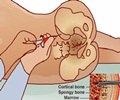Excessive bone growth, also known as heterotopic ossificiation (HO), affects up to 70 percent of soldiers who are severely wounded during combat, a recent United States Army study has found.
A much smaller percentage of the civilian population also suffers from HO following trauma or invasive surgery. The excessive bone forms within muscles and other tissues causing severe pain, reduced mobility and even local paralysis if untreated. A new study by Thomas Jefferson University researchers found a way to prevent HO in animal models by shutting the process off in its early stages. The study, reported in September's Journal of Orthopaedic Research, is expected to lead to clinical trials and may hopefully provide a new, effective and safe treatment for HO."This is a major breakthrough in HO research," said Primary Investigator Maurizio Pacifici, Ph.D, director of Orthopedic Research at Jefferson Medical College of Thomas Jefferson University. "We are able to largely prevent formation and progression of HO lesions. We presented our initial results at a recent U.S. Army Extremity War Injuries Symposium in Washington D.C. and they were very well-received and have elicited great hope on the part of military physicians to finally have a way to stop HO in troops wounded in war zones."
In the ongoing study sponsored by the U.S. Army, Jefferson scientists were able to prevent HO by disrupting a series of cellular changes that are needed to produce HO. Following a trauma or invasive surgery, the condition begins when progenitor and stem cells are recruited to the injured site and give rise to cartilage tissue that then turns to bone. This multi-step process is regulated by several factors. One of these factors is a protein in the nucleus of the progenitor cells that is called the retinoid alpha receptor. This receptor must be turned off before the progenitor cells can form cartilage tissue. The Jefferson scientists, using a pharmacological agent, an alpha agonist, kept the receptors active, stifling the initiation of the disease in its tracks.
"The agonist we used in this case is an experimental drug that is not on the market yet, but is being tested in Phase II human trials for another disease. We tested whether the drug could work to prevent HO, thereby looking for another application for the drug," said Pacifici.
HO treatments for the general population exist now, but are not always effective and can produce side effects. Low-dose irradiation, postoperative nonsteroidal anti-inflammatory drugs or a combination of both are the current routine treatments for HO. When these treatments fail and patients require surgical removal of HO lesions, some complications can arise, including instigation of a new round of HO formation. These treatments are currently not used in wounded soldiers because they could have additionalcomplications. For example, low-dose irradiation could reduce the healing capacity of tissues. Since the alpha agonist should not interfere with these processes, it could prove to be a suitable treatment without the significant side effects.
Because current HO treatments cannot be used, HO remains a potentially serious problem due to the high incidence among military personnel. Also without treatment, HO can progress and spread becoming much more serious over time. Hopefully, if clinical trials are done and prove successful this treatment could be used as a cure for not only HO but for other HO-related diseases including Fibrodysplasia Ossificans Progressive (FOP), an inheritable and severe form of HO.
Advertisement
Advertisement
RAS












